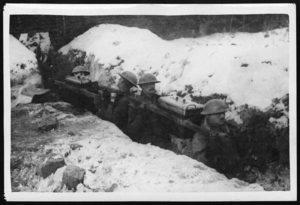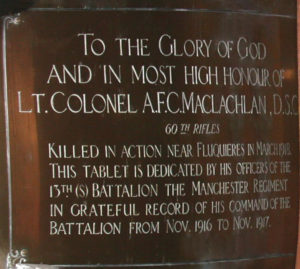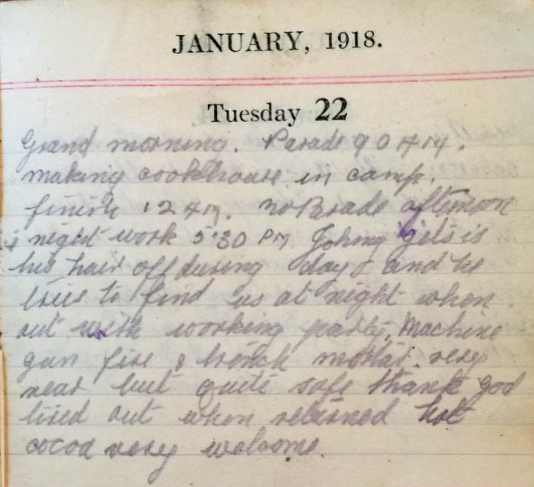Tuesday Jan 22nd, 1918
Grand morning. Parade 9am. Making cookhouse in camp. Finish 12pm. No parade afternoon. Night work 5:30pm. Johnny gets his hair off during day and he tries to find us at night when out with working party. Machine gun fire and trench mortar – very near but quite safe – thank God. Tired but when returned hot cocoa very welcome.
Cookhouse
This seems to a perfect job for Frank. As we all know food is a particular obsession of his – so to be helping to improve the cooking facilities for the Battalion must have seemed like a wonderful idea. Luckily he has the afternoon off as he is out again tonight improving the communication trenches between the reserve and front lines (see yesterday’s entry for details).
See the following short film on cooking in the trenches from British Pathé:¹
The following is an extract from an article about Battalion cooking in ‘Military History’. A link to the full article is provided below.

‘Each battalion was assigned two industrial-sized vats for food preparation. The problem was that every type of meal was readied within these containers, and so, over time, everything started to taste the same. As a result, pea-and-horse flavoured tea was something the soldiers had to get used to.
Food transportation was also an issue. By the time it reached the front, bread and biscuits had turned stale and other produce had gone off. In order to combat this, soldiers crumbled the hard food that arrived and added potatoes, sultanas, and onions to soften the mixture up. This concoction would then be boiled in a sandbag and eaten as a sandy, stale soup.
Soldiers and kitchen staff were forced to carry soups and stews through the communication trenches in cooking pans, petrol cans, and jars.’ ²
Remembering a Commanding Officer

The Battalion diary entry for today lauds Lt Colonel AFC Maclachlan DSO, KRRC for being awarded a bar to his Distinguished Service Order. Maclachlan had commanded the 13th Manchester’s from November 1916 until November 1917. Unfortunately he was to be killed in action (KIA) near Fluquieres in France two months from today.
He and his brother Brig General RC Maclachlan DSO (KIA Aug 11th 1917) were to be remembered on the war memorial in Newton Valance, Hampshire and in St Mary’s, the local church. A third brother, Neil, was also commemorated. He had died while with the Seaforth Highlanders in India in May 1908.
Touchingly, the Officers of the 13th placed a plaque (see image) in this church in memory of their beloved commanding officer.
13th (Service) Battalion War Diary – 22nd January 1918 – Vladaja Camp
All permits to take photographs have to be endorsed by APM, 22nd Div permission to develop & print photographs has to be obtained. (GHQ letter AS no 540 of 12-9-17). Mess Allowance will be issued as follows: Personal Allowances at the rate of £6 pa will be issued monthly in arrears by the Paymaster or agent who issues his pay to every officer on Regt pay not above the rank of Major or Captain, RE (Royal Engineers – Ed.) & ASC (Army Service Corps – Ed.). The unit Allowances granted under Section 18 ?? ?? will be discontinued from 1-1-18. No claims should be rendered to the Command Paymaster (extract GPO no 298 para 1654 dated 18-1-18). Extracts from London Gazette (supplement) dated Jan 1st 1918. Rewards : – Awarded a bar to the Distinguished Service Order Major & Bt Lt Col (T/Lt Col) AFC MacLachlan DSO, KRRC. Awarded the Military Cross: T/Capt FO Thorne, Manchester Regiment.
References & further reading
1 Trench Cooking (1914-18), copyright British Pathé
² ‘War Culture – Trench Food‘ in Military History.org
* Photograph from collection of Field Marshall (Earl) Haig, National Library of Scotland


